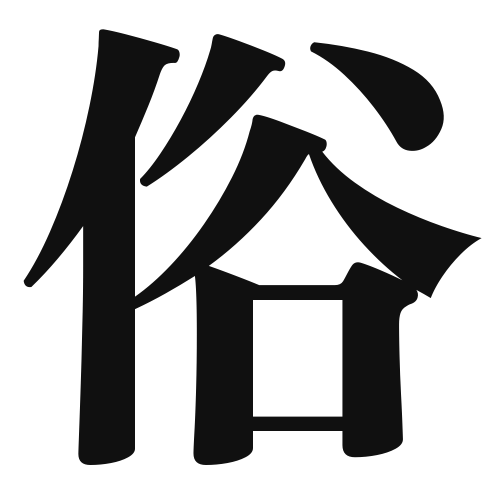1. Overview of Meaning
The kanji “俗” (zoku) generally means “vulgar,” “common,” or “secular.” It often refers to things that are ordinary or related to the everyday life of people, as opposed to the sacred or refined.
2. Formation and Radical
Formation of the Kanji: The kanji “俗” is a phonetic-ideographic character (形声文字). It combines the radical for “person” (亻) on the left, indicating a relation to people, and the phonetic component “zoku” (俗) on the right, which provides the sound.
Radical: The radical of “俗” is 亻, which is related to human beings or actions performed by people.
3. Examples of Usage
Common Words and Phrases: Some frequently used words that include “俗” are:
- 俗語 (zokugo) – colloquial expressions or slang
- 俗世 (zokusei) – the secular world
Example Sentences in Daily Conversation:
- 彼は俗語を使うのが好きです。 (Kare wa zokugo o tsukau no ga suki desu.) – He likes to use slang.
- 俗世のことを忘れて、自然の中で過ごしたい。 (Zokusei no koto o wasurete, shizen no naka de sugoshitai.) – I want to forget about the secular world and spend time in nature.
4. Synonyms and Antonyms
Similar Kanji: A kanji with a similar meaning is “一般” (ippan), which means “general” or “common.” However, “一般” is more neutral, while “俗” often carries a connotation of being less refined.
Opposite Kanji: An antonym for “俗” is “聖” (sei), which means “sacred” or “holy.” This highlights the contrast between the secular and the divine.
5. Cultural and Historical Background
Relation to Japanese Culture: In Japanese culture, “俗” often appears in discussions about societal norms and behaviors that are considered common or ordinary. It can also reflect the tension between traditional values and modern, everyday life.
Proverbs and Idioms: One common saying is “俗に言う” (zoku ni iu), which translates to “as they say” or “commonly said,” indicating a phrase or idea that is widely recognized in everyday conversation.
